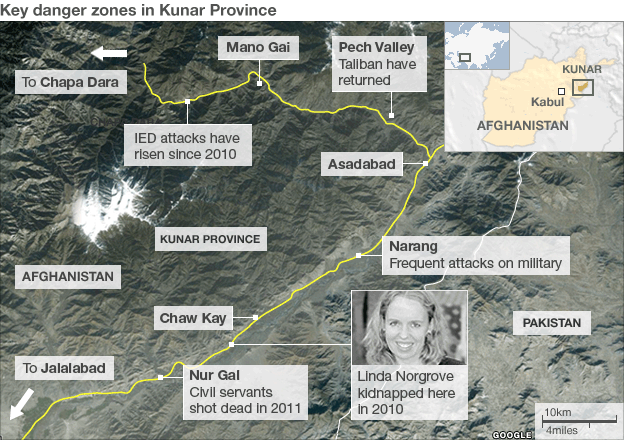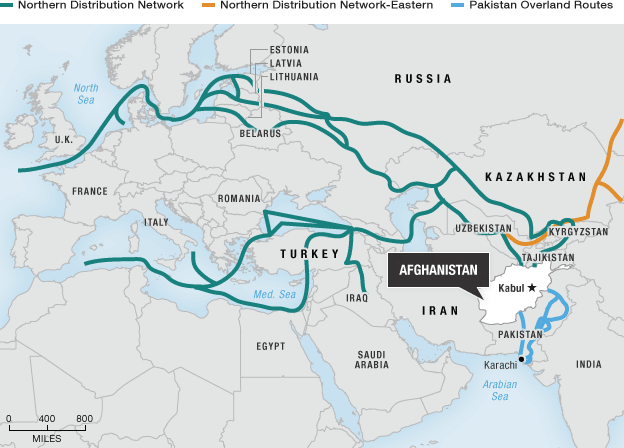After have read Men, Not Machines, Win Wars, I find that my thoughts were not clearly presented, making it not just possible, but probable, that my prose would be misconstrued. Any misconstrual is my fault.
Tim Lynch doesn’t misconstrue my points, but some of the commenters in his Sanctuary Denied? shows that I need both to clarify my views and address Tim’s (and his commenters). Anytime Tim speaks it’s worthy of time and consideration, and we are all richer for having his work and thoughts on our campaign in Afghanistan (as well as on military matters generally). I consider Tim’s friendship to be a blessing and honor.
First of all, to Tim’s response.
Herschel Smith is unimpressed with the reported build up in the east of Afghanistan and I can’t remember a time he’s been wrong about anything. His assessment could prove to be spot on but this is one time I hope it isn’t.
Afghanistan President Karzai has threatened to back Pakistan if the US conducts cross border operations. Secretary of State Clinton stopped by for a few words with President Karzai who immediately gave a TV interview telling the world he would side with Pakistan. I guess the SecState failed to get her message across. Big frigging surprise there.
[ … ]
We have known since the very first days of this conflict that the Taliban use the border area for sanctuary after they try to attack our troops and start getting their asses kicked in response. We have been good about not going across in “hot pursuit” having limited incursions into Pakistan to one that I know of.
We have alternate supply lines, we have stocks of stuff on hand, we still need to move supplies through Pakistan so what to do? How about this famous quote “Never take counsel in your fears”. The Pakistani’s have been playing us off since just after we started in October of 2001. Back then they were all about cooperation, as was every other country in the world except the ones that don’t matter anyway. The reason they were so cooperative was they knew we were in the blind rage stage of being pissed off. That is several steps up the pissed off ladder and nobody at that time was sure what we were going to do. All they knew was that we were capable of doing whatever the hell we wanted to do. We still are. In fact given the billions spent on hight tech platforms we could do destroy more, faster, and with greater efficiency than we could a decade ago.
From watching that 60 minutes segment with General Allen I am certain of one thing. He’s pissed. And he’s pissed about how Pakistan has been playing us and he is not the kind of man you want pissed at you. Take it from me because I’ve been there with him and it is not pleasant. Most of you do not know General Allen or anything about him. What you need to know is he understands that unlimited sanctuary is no way to fight a war. And even though he doesn’t have the political capitol of General Petraeus he has his confidence. As he does with General Mattis – another fighting general who is not too keen on granting anyone sanctuary. I know calls like going across the border in hot pursuit are the Presidents to make but we all now know (thanks to Ron Suskind) that the White House is dysfunctional and getting the President to make a firm decision about anything almost impossible. National level leadership of that kind allows for subordinates to make “interpretations of intent”. A fancy way of saying they can make their own decisions and take the actions they think fit Obama’s intent.
A few thoughts about Tim’s views here (beyond the fact that with Tim, I hope I am wrong about a great many of the things I have said). America has always had a love affair with generals. For me, General George S. Patton is my hero. But let’s say that I knew at the time of the most intense fighting during World War II that Patton’s drive across Sicily cost the lives of American Soldiers because Patton wanted to best Montgomery. If my son had perished in Sicily I would have burned with hated for the man.
On the other hand, the hardening of his Army created the ability to attack the Germans with two divisions within 48 hours across 100 miles of frozen tundra to relieve the Americans at Bastonge and end the German offensive. It was the feat of supermen. There are sterling successes and dark secrets about all generals, just as there are with each of us.
I don’t know general Allen, but I hold this against general Mattis. The prosecution of the Haditha Marines occurred under his watch. My own son went into the Marine Corps and by the time he hit boot camp and SOI, he was trained by Marine veterans of Al-Fajr. Veterans of Al-Fajr trained their Marines a certain way, to do certain things, and to see combat a certain way. In 2005, room clearing operations meant that whomever was in the room died. It’s just the way it was. It was expectation. It was training. It was tribal knowledge, passed down from Marine to Marine. It all occurred so rapidly that identification of the inhabitants of the room was irrelevant and impossible anyway. Mattis knows this, and still he allowed good men to have their reputations tarnished. I hold this against him, and I always will.
So the fact that the names of Allen and Mattis are mentioned is not determinative for me. There must be more. There must be commitment at the upper echelons of the administration. Sometimes it’s best to let your readers speak for you, and concerning the notion that I simply didn’t know everything that Petraeus had up his sleeve when went to Pakistan to solicit their support (a sentiment on the comments to my first post), TSAlfabet had this to say.
… there is no such thing as secret anything when it comes to the U.S. government. As Wikileaks, the NYT, The WaPo and LA Times have all demonstrated, there is always an abundance of people with access to “top secrets” who are willing to blab to the media in exchange for anonymity and whatever smug feelings of superiority they get from betraying secrets.
So, for instance, when the U.S. needed to get tough with Pakistan in 2001 in the immediate aftermath of the 9/11 attacks, the U.S. knew exactly what to say to the Pakis in order to secure their, ahem, “cooperation.” Yes, there were goodies thrown in and charm pops blah blah, but the bottom line, “secret” message to Musharraf et al was, “You either work with us on rooting out Al Qaeda or we are going to turn your country into a parking lot. Your choice.” Not surprisingly, the Pakis chose to cooperate, albeit with as much fudging, double-crossing and reluctance as they thought they could get away with.
And how do we know that? Because these “secret” conversations were leaked to the press and, eventually I think, by Musharraf himself after he lost power and went on his rock-star media tour. It is a permanent feature of American power that there are no, real secrets. Only suppressed facts. I.e., if the secrets hurt conservatives or help liberals, you can be sure that the leaks will get front page news and be on every Left Wing media channel. If the secrets hurt liberals or embarrass a Democrat, you can be sure that the Leftist Media will ignore, suppress, excuse, counterattack in whatever way possible.
Now, ten years later, what is that Paki attitude? Do you think they are even a little bit scared of any threats coming from the U.S.? The Pakis are shelling U.S. troops according to the recent NYT article that is posted here at TCJ recently. The Pakis, according to our own CIA and Admiral Mullen are openly using the Haqqanis to attack the U.S. in A-stan.
No, the SCREW UPs don’t have anything up their sleeve. If they did, we would see real results. We would see a mysterious drop in cross-border attacks from Pakistan. We would see, with Iran, a decreasing belligerence.
No indeed. What you see is what you get. And we, the U.S. of A, are getting the finger from every tin pot dictator and 3d world thug out there. Obama and his circus show have made us a laughingstock the world over. Anyone who gets elected (short of Ron Paul) would be better than Obama.
As if on cue, the Taliban have gone on record with the BBC saying that Pakistan’s ISI assists them.
Pakistan has repeatedly denied the claims. But the BBC documentary series Secret Pakistan has spoken to a number of middle-ranking – and still active – Taliban commanders who provide detailed evidence of how the Pakistan ISI has rebuilt, trained and supported the Taliban throughout its war on the US in Afghanistan.
“For a fighter there are two important things – supplies and a place to hide,” said one Taliban commander, who fights under the name Mullah Qaseem. “Pakistan plays a significant role. First they support us by providing a place to hide which is really important. Secondly, they provide us with weapons.”
Another commander, Najib, says: “Because Obama put more troops into Afghanistan and increased operations here, so Pakistan’s support for us increased as well.”
He says his militia received a supply truck with “500 landmines with remote controls, 20 rocket-propelled grenade launchers with 2000 to 3000 grenades… AK-47s, machine-guns and rockets”.
See also the Reuters report. Of course, Pakistan denied the BBC report, but the reader can make up his own mind. But generals notwithstanding, a more aggressive stand towards Pakistan would require White House approval.
To clarify, my original post, which Tim didn’t misunderstand, did not advocate full scale engagement of Pakistani forces. But this comment goes beyond what I advocate (although I didn’t make that clear).
The odds of General Allen launching a full-on sustained invasion of Pakistan on his own say-so, and being backed by his superiors, while the rest of the federal government stands by, are roughly equal to the probability that he’ll launch his own space program and start to terraform Venus, or send a MEF up the Potomac. I’ll put $100 down saying that no such thing happens, with a side bet of $200 saying that if it does, we’ll pull out in a week like in Lam Son.
Two quick observations on this. First, I advocate that we conduct ourselves with the same respect for the Durand line that Pakistani forces show it, not that we launch a “full-on sustained invasion of Pakistan.” I also advocate that we make larger use of or air assets in conjunction with land incursions. If we find bases, use Arty or send the A-10s after them, no apologies, no regrets. Kill them all, combatants and any other inhabitants. Turn their terrain into a parking lot.
Second, the commenter is right anyway. We wouldn’t even do this without White House approval. That’s not a knock on the generals. That’s reality. And how many readers think that this White House would give approval for this approach?





